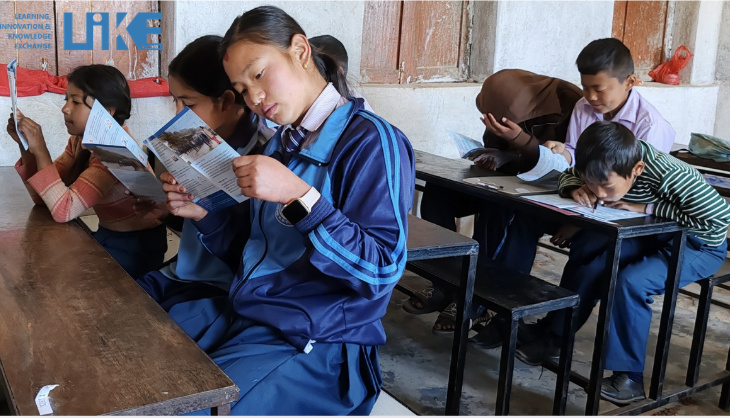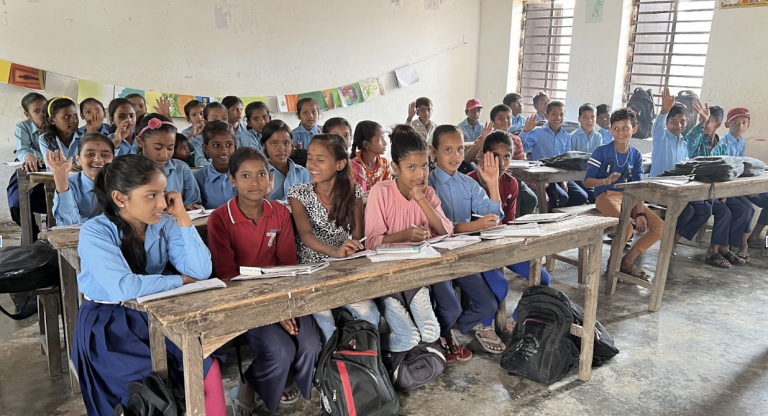Posted On: 29th July, 2022
Authors: Binayak Krishna Thapa, Shreda Shrestha
How can the capacity to aspire of children in rural settings be understood? To get this answer, we researchers agreed to inquire and know about their plans. We assumed that children can make sense of, imagine and think about their future. Their capacity to make sense of, imagine, and think about their future was what we considered equivalent to their aspirational capacity. This connects well with their being educated and pursuing education. Schools, where children receive schooling, ought to help enhance their aspirations and nourish their hope for better being and doing as a student in school and community. Schooling needs to foster children’s sense and imagination through the expansion of their horizons for becoming better people in the future. As aspiration connects well with new possibilities, such possibilities become bleak when there are no opportunities to go to school or to complete certain basic years of schooling. Lack of schooling potentially contributes to a lesser ability to sense, imagine and think of alternative futures, on part of both children and their parents. Wherever there is denial or diminished children’s capacity to aspire, there is no future.
What’s the mindset of children in rural settings regarding the experiences of pursuing education and being educated? Do they value their schooling? How do they connect their future with the education they receive? What are their aspirations of being and becoming in the future? These questions were important for us as researchers, to at least make sense of the low attendance, high drop-out rates, and being out of school, that characterized the students’ education status, performance, achievement, and schooling in the rural part of the Terai belt of Nepal.
To get the answer to the above-stated questions, we set out to the field site in November 2021, and subsequently visited the same area between the months of mid-March to mid-April 2022. The selected research site was two rural municipalities of the Rautahat district namely Durga Bhagwati and Yammunamai rural municipality. We chose these field sites as these places had a high magnitude of out-of-school children, and dropout numbers too. During the field visit, 17 schools of Durga Bhagwati and 8 schools of Yammunamai municipality were visited, where, we held interviews with head teachers, teachers, local municipal authorities, and local education officers and most importantly we conducted ten focus group discussions with students from different grades (grade 6 – 9). These 10 sessions of focus group discussion comprised 5 sessions each between girls and boys. The aspirations of the children detailed in this write-up are drawn from these group discussions.
We researchers do not claim to have information on what influences children’s preferences, ambitions, and aspirations. However, what we intend to offer is just their sense, imagination, and thoughts on what they want to be or aspire to become in the future. In this regard, we do assume their opinion on what they want to become is what they value and have reason to value.
The girl students aspire to be staff nurses, doctors, police, computer engineer, bank manager, teacher, mayors, Mukhiya, beauticians, and tailor masters. Each girl had a solid reason for her aspiration. They wanted to be teachers to impart knowledge to children, the girls wanted to be engineers and wished to build a beautiful house, and the aspiration to be a doctor was related to the fact that they wanted to serve their community to be healthy. A good number of girls want to keep their society and country safe by serving in the Nepal Police and Army, it was something unthought of but not at all surprising. The aspirations shared hinted that the girls want the best for their future, society, and country exemplified in the fact that a few girls also aspire to be the Mayor and Mukhiya.
When the boys were asked about what they wished to become in the future, each of them shared their aspirations. The bundle of aspirations is comprised of various professions. These were doctors, singers, police, army, cricketer, engineer, bank managers, teachers, pilots, painters, and many more. These were the professions they valued and had reason to value. One of them explained his aspiration to become an army for he wanted to engage in national security, for those who wanted to pursue or become doctors informed that they wanted to help poor ill persons and elderly too. Those who aspired to be the police wanted to end alcohol intake in their society and maintain calm and harmony in the community. They collectively believed and stated that quality education was needed, ‘we need to learn new things, sir’.
As stated by Waker (2020) on Appadurai’s argument that aspirations are a resource for people living in poverty, and to struggle and better their life for higher well-being is where the role of education comes into play. Hence, schools ought to be responsible for contributing to conditions that enable the students’ capacity to aspire. Schools are those places where aspirations are produced and reproduced and hence children’s education is significantly crucial for those marginalized, living in deprivation and destitution so that, they can have an opportunity to construct their hopes far beyond the disadvantaged circumstances they live in.



